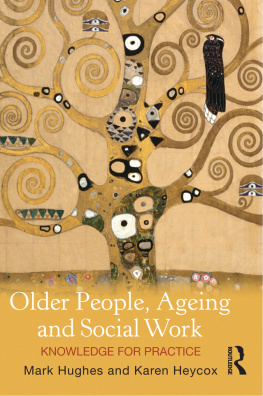SOCIAL WORK
AND THE TRANSFORMATION
OF ADULT SOCIAL CARE
Perpetuating a distorted vision?
Mark Lymbery and Karen Postle
First published in Great Britain in 2015 by
Policy Press University of Bristol 1-9 Old Park Hill Bristol BS2 8BB UK Tel +44 (0)117 954 5940 e-mail
North American office: Policy Press c/o The University of Chicago Press 1427 East 60th Street Chicago, IL 60637, USA t: +1 773 702 7700 f: +1 773-702-9756 e:
Policy Press 2015
British Library Cataloguing in Publication Data
A catalogue record for this book is available from the British Library.
Library of Congress Cataloging-in-Publication Data
A catalog record for this book has been requested.
ISBN 978-1-4473-1042-6 ePub
ISBN 978-1-4473-1043-3 Kindle
The right of Mark Lymbery and Karen Postle to be identified as authors of this work has been asserted by them in accordance with the Copyright, Designs and Patents Act 1988.
All rights reserved: no part of this publication may be reproduced, stored in a retrieval system, or transmitted in any form or by any means, electronic, mechanical, photocopying, recording, or otherwise without the prior permission of Policy Press.
The statements and opinions contained within this publication are solely those of the editors and contributors and not of the University of Bristol or Policy Press. The University of Bristol and Policy Press disclaim responsibility for any injury to persons or property resulting from any material published in this publication.
Policy Press works to counter discrimination on grounds of gender, race, disability, age and sexuality.
Cover design by Soapbox Design, London
Front cover: image kindly supplied by istock
Readers Guide
This book has been optimised for PDA.
Tables may have been presented to accommodate this devices limitations.
Image presentation is limited by this devices limitations.
In memory of Heather Clark
(14 August 1949 21 October 2014)
Friend, colleague and champion of older people
Dedication
Both of the authors have recently had and/or continue to experience serious illness. Both of us have immense gratitude for the care that we have received from skilled and dedicated staff within the National Health Service. At the time of writing we see threats to the NHS from increasing privatisation and marketisation, and so we decided to dedicate this book to this amazing institution, with our hope that health care will continue to be provided in the public sector on a not-for-profit basis.
Contents
Acknowledgements
As is always the case in completing a book of this nature there are a number of acknowledgements that we need to make. First we wish to convey our thanks to Helen Gorman for allowing us to adapt and update the text on which she worked so hard. We also wish to convey our thanks for the patience shown by Isobel Bainton and the team at Policy Press. Finally, our thanks and gratitude go to Tina Eadie and Tony Postle for their support and seemingly inexhaustible patience.
Our thanks go to the following publishers for allowing their work to be used in this text:
Taylor & Francis and the editors of the Journal of Social Work :
Lymbery, M. (2014) Understanding personalisation: Implications for social work, Journal of Social Work , 14 (3): 295312 (part of Chapter Five).
Oxford University Press and the editors of the British Journal of Social Work:
Lymbery, M. (2014) Social work and personalisation: Fracturing the bureau-professional compact? British Journal of Social Work , 44 (4): 795811 (part of Chapter Six).
Lymbery, M. and Postle, K. (2010) Social work in the context of adult social care in England and the resultant implications for social work education, British Journal of Social Work , 40 (8): 250222 (parts of Chapters Seven and Ten).
Taylor & Francis and the editors of Practice :
Postle, K. (2014) Classic Text review: Empowerment, Assessment and the Skilled Worker , Practice: Social Work in Action , 26 (5): 32731 (part of Chapter Seven).
Preface
The National Health Service and Community Care Act 1990 ushered in a new regime of community care which marked a considerable change in the way in which social workers, who often became termed care managers, worked with adults and older people. Helen Gorman and Karen Postle had both completed doctoral studies, based on empirical research, examining the work of care managers/social workers. In 2003 they published Transforming Community Care: A Distorted Vision (Venture Press) in which they argued that the rhetoric of community care was not borne out by the practice, and that in fact the version of community care that was being implemented was a distortion of the principles that supposedly characterised it.
The years since 2003 have seen further legislation and policy, and even greater changes in social work with adults and older people. The greatest change has been the personalisation agenda, stemming from policy documents in the late 2000s. As with community care previously, the rhetoric of these documents does not appear to match the reality of much social work practice. Indeed, as we will argue, there has also been a distortion of the fundamental principles of personalisation in the process of implementation. This has been an area of ongoing research for Mark Lymbery, continuing beyond his own doctoral studies.
Given the extent of the changes brought about by, first, the new regime of community care and then personalisation, and considering the context of increasing austerity, the time seemed right for a substantially revised edition of the original text. This book therefore uses pertinent material from the original book and updates this to include changes in legislation and policy. It also incorporates recent, relevant research. The current authors, Mark Lymbery and Karen Postle, continue to argue, as Gorman and Postle did, for the continued significance of social work within the context of adult social care, where skilled work can make real differences to the lives of adults and older people.
Mark Lymbery and Karen Postle
October 2014
ONE
Introduction
Setting the scene
The first edition of this book began with the story of how the BBC covered the circumstances of Mr Trebus, an obviously troubled man. This was included because it illustrated two things. First, the ways in which community, often presented as a simple, unified concept, is actually much more complex than this. Second, the way in which concerns about an individual were presented by the mass media, despite community care having been in existence for several years. Although this documentary, and Gorman and Postles (2003) comments on it, are over a decade old at the time of writing this, we have retained this material because the two issues it raised at the time remain current. The details of this example were as follows: on 3 May 2001 BBC1 screened a Life of Grime Special about Mr Trebus. This was the trailer in the Radio Times :
This update (of a previous programme screened two years previously) has all the qualities that made the Polish war veterans battle so fascinating: his anti-authoritarianism, his terrier-like refusal to see reason and his ability to live in squalor without apparently noticing (Lass, 2001: 104)









